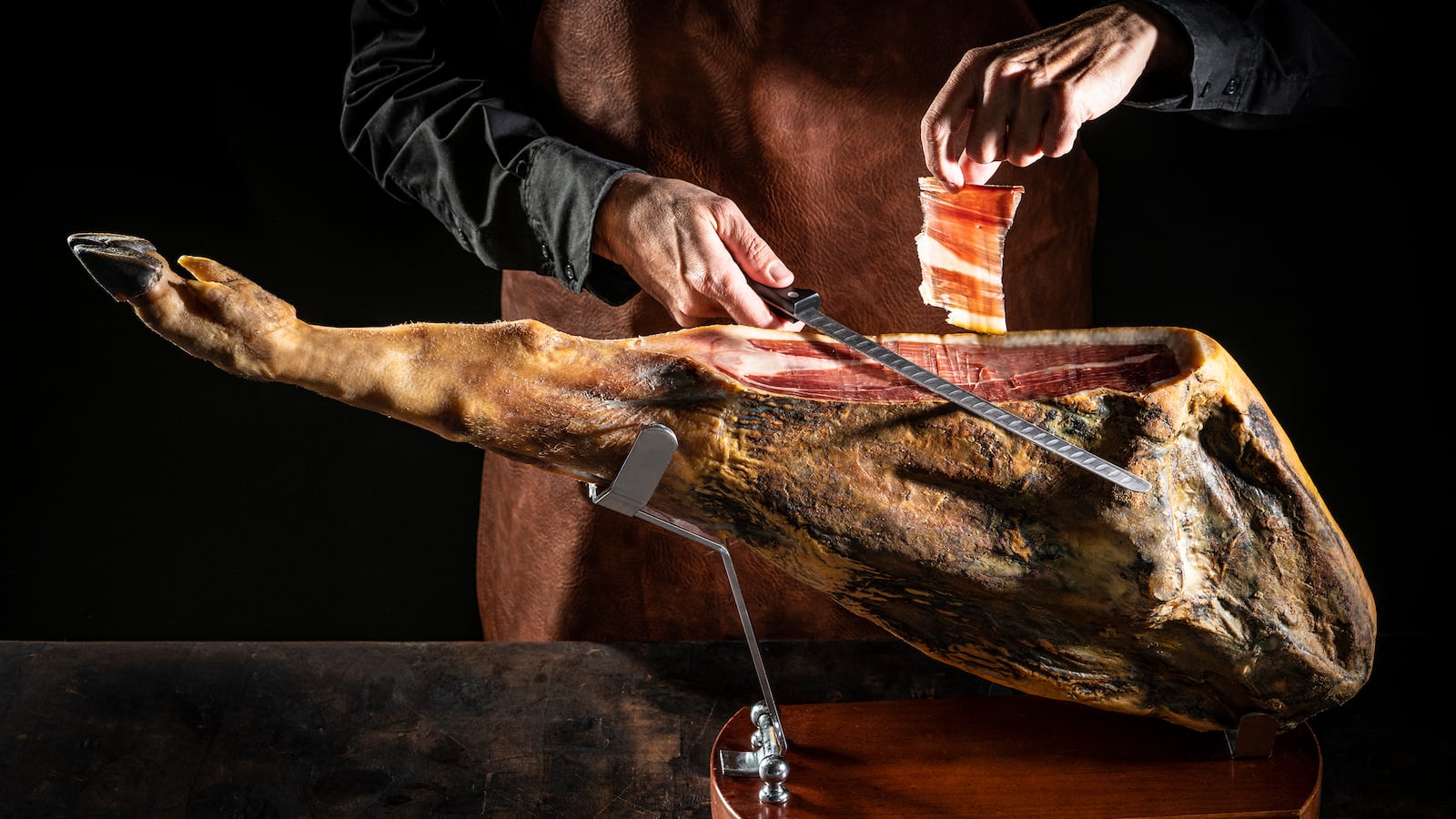In the Notes app on my phone, I keep a list called “Ingredients to Buy in the U.S.” Horseradish, cake flour, molasses, Chex Mix—I can’t find certain American foods in Madrid, so I lug them back with me, weight allowances be damned. But customs always swipes my most prized Proustian treasure, one that’s absent, astoundingly, in the Iberian Peninsula: good bacon. Smoky, crispy, sizzling slices of American-style bacon.
Bacon is Spain’s biggest culinary disappointment. Flabby, elastic, and chronically undercooked, it’s always too thick or too thin, too salty or too bland. It boasts neither the heady campfire scent of American bacon nor a whit of its tantalizing crispness. Bite into Spanish bacon, and it often bites you back, with nubbins of untrimmed cartilage cracking audibly between your teeth. The more bacon I spat into napkins in Spain, the more puzzled I became. Surely the culture that gave us chorizo and torreznos and exquisite Ibérico ham could make great bacon. So why was it nowhere to be found?
As I started digging for answers, I couldn’t help wondering, AITA? We food writers are an insufferable, persnickety lot; it’s how we make our living. Yet apparently misery loves company as much as Americans in Madrid love to whine about Spanish bacon. “It’s the color for me,” lamented my Ohioan friend Marlee, her nose wrinkling in disgust. “Too pink. It’s creepy.” Her roommate Regina, from Long Island, was quick to pile on: “As far as I’m concerned, there is no bacon in Madrid,” to which Melissa, from Queens, replied, “There was bacon on the table this morning. I gave mine away.”
Marti Buckley, the Alabama-born author of Basque Country, strikes a more diplomatic tone. “Spaniards have a different outlook on what bacon is supposed to be,” she said, just as Americans conceive of ham as a boiled deli meat as opposed to something salty and dry-cured like Ibérico or Serrano. “Spaniards believe in their hearts that they’ve already created the world’s best pork product in jamón ibérico,” she said. “I think they kind of gave up on bacon.”
Maybe it’s false equivalence, maybe the Spanish don’t know what they’re missing. My partner, Marcos, a Madrid native, had written bacon off until he enveloped his first lumberjack breakfast at a diner in Connecticut. “I remember thinking, ‘This looks burnt,’” he said. “But when I took a bite, it was marvelously crunchy and meaty. It was one of those a-ha food moments you don’t often get as an adult.”
Anecdotally, at least, Americans and enlightened Spaniards agreed: Spain was getting a raw deal on bacon—but why? Almudena Villegas Becerril, Spanish food historian and author of Luxus Mensae, says the answer lies in bacon’s origins. A staple protein across medieval Europe, bacon was invented as a way to extend fresh pork’s shelf life without relying on refrigeration. “Along the Mediterranean basin, simply salting and air-drying the meat was enough,” she said, while in cooler, humid climes like Northern Europe and much of North America, the additional step of smoking was needed to fend off mold and undesirable bacteria. The hickory- and applewood-smoked bacon devoured by Americans today harks back to the latter tradition.
I now understood why Spanish bacon registered as bland on my smoke-seeking American palate, but the texture—what was going on with the texture? “In Spain, bacon was never fried but rather boiled,” said Villegas, using the word tocino to refer to the unsmoked bacon cooks toss into stews. The reason was simple: thrift. “You get more mileage out of a hunk of bacon when you add it to a pot of beans. None of the precious fat is lost in cooking, and you get lots of flavor and nutrition,” she said. So when fried bacon reached Spain a few decades ago, in the form of unadorned bacon bocadillos (hoagies) and low-cost platos combinados (combo-meals), Spaniards preferred it on the softer, fattier side like the stewed tocino they grew up on.
Boiled, fried, or otherwise, bacon isn’t a breakfast food in Spain; neither, remarkably, are eggs. (Spaniards are rather abstemious about breakfast: toast, coffee, a churro if you’re lucky.) But breakfast in America is an event, which came into perspective only when I moved away.
Lately I’ve been missing the foil-wrapped egg sandwiches. The maple syrup on the table. Free coffee refills. Dad’s bacon on Sunday mornings… Do I hate Spanish bacon, or am I just homesick? The lines are blurry, but facts are facts: If I want good bacon in Spain, I’d better learn how to use a smoker.

